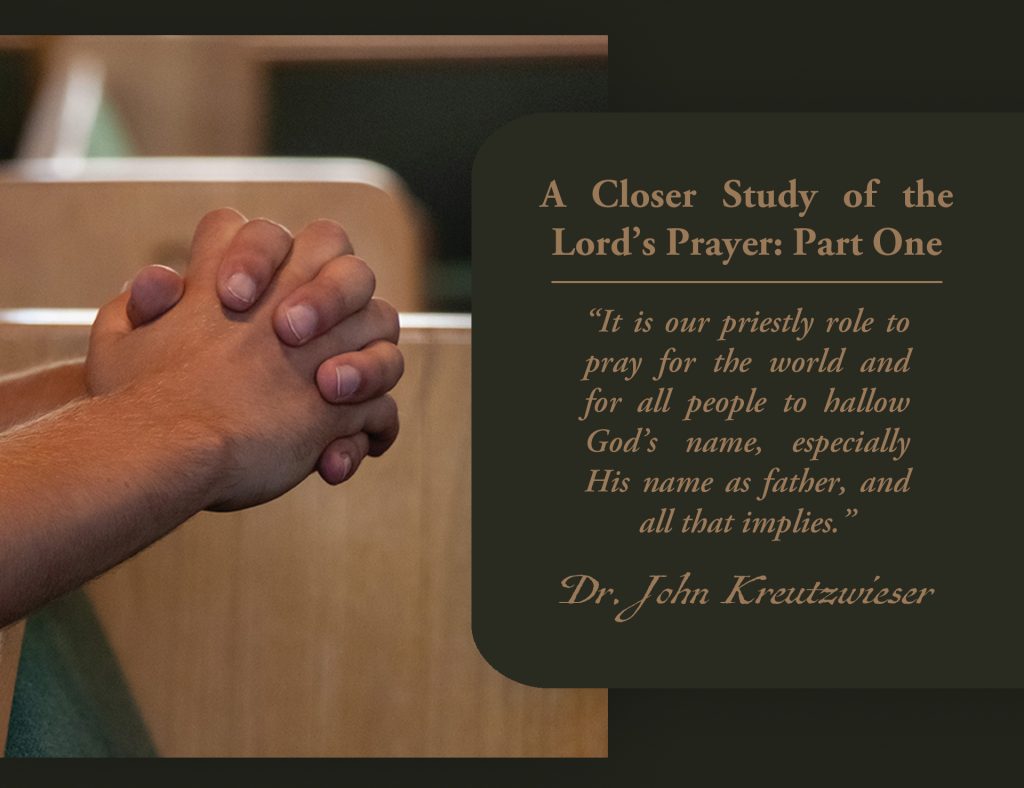A Closer Study of the Lord’s Prayer: Part One
 NOTE: This is the first in a series of study articles on the Lord’s Prayer. Before reading, you may wish to see Rev. Dr. John Kreutzwieser’s introduction to the series here.
NOTE: This is the first in a series of study articles on the Lord’s Prayer. Before reading, you may wish to see Rev. Dr. John Kreutzwieser’s introduction to the series here.
by John Kreutzwieser
Our Father who art in heaven / Hallowed be Thy name
Jesus taught His disciples to call upon the Almighty God in daily prayer as to a father. Our earthly fathers have been instrumental in giving us life, and in many cases have nurtured and cared for that life. We are instructed to view God has our father, the perfect father.
“Our Father who art in heaven.” Jesus used the plural for heaven, in essence saying, “who is in the heavens.” This is the Father who dwells in the spiritual realm. This denotes God’s ability to know, see, and do all things, and expresses His absolute lordship over all things. This father is worthy of all our prayers and petitions.
God is the ultimate source of our lives (see Acts 17:24-28). Christians recognize the Father who is in the heavens as the Creator of all things, who also has a loving interest in each person He has blessed with life. He is an amazing Father, the source and supreme example for all fathers. From the moment of the first man, God filled life with His gifts (see Genesis 2:7-8, 15, 18). So to we are reminded by James: “Every good gift and every perfect gift is from above, coming down from the Father of lights” (James 1:17). The Father nurtures and cares for His people through the created order (see Psalm 104:14-15) and through the means of grace, His precious Word and holy Sacrament.
Even though we have fallen from grace and distanced ourselves from the Father, He sends His most precious gift, His own dear Son (see Romans 5:8-11). Even though we so often go our own way in life, He is an extravagant Father who runs to us, embraces us, and loves us. The Father’s love never wavers. The Father affirms those in Christ as dear children (see Luke 15:11-24). The Father loves and names each Christian His own child in Baptism through faith (see Galatians 3:26-27, 1 John 3:1). And so, we can pray to the Creator as a child speaks to a father (see Romans 8:15-16). This perfect Father will give us good gifts, including the Holy Spirit who will enlighten, sanctify, and keep us with Jesus Christ in the one true faith (see Luke 11:10-13).
The Father nurtures and cares for His people through the created order and through the means of grace, His precious Word and holy Sacrament.
We pray that the whole world would come to realize this surpassing knowledge of God as Father in the heavens. It is our priestly role to pray for the world and for all people to hallow God’s name, especially His name as father, and all that implies. The holy name revealed to Moses at the burning bush (see Exodus 3:13-15) is the only God, as Isaiah 42:8 states: “I am the LORD; that is My name; My glory I give to no other, nor My praise to carved idols.” His glory is revealed as the Father of Jesus Christ and as Father for all people who bow at the name of Jesus (see Philippians 2:10-11).
We pray that all people would acknowledge and have faith in this God. The second commandment states: “You shall not take the name of the Lord your God in vain.” People apart from Christ view God and His name as empty and worthless. This is the meaning of the Hebrew word translated here as “vain.” But to those whom the Holy Spirit has called and engendered faith in Jesus Christ, there is fullness of life, value, and meaning to be discovered in the name of God (see Isaiah 29:23). In the death and resurrection of Jesus Christ, God declared His holiness and called all to sanctify His name (see Ezekiel 36:22-23).
It is in this first unit of the Lord’s Prayer that we petition God, each day, for His name to be hallowed, not only in our lives but also in the lives of every person who has been given the gift of life from the Father. As St. Paul wrote: “I urge that supplications, prayers, intercessions, and thanksgiving be made for all people…. This is good, and it is pleasing in the sight of God our Saviour, who desires all people to be saved and to come to the knowledge of the truth” (1 Timothy 2:1-4).
———————
Rev. Dr. John Kreutzwieser is pastor emeritus of Emmanuel Lutheran Church in Moose Jaw, Saskatchewan.





